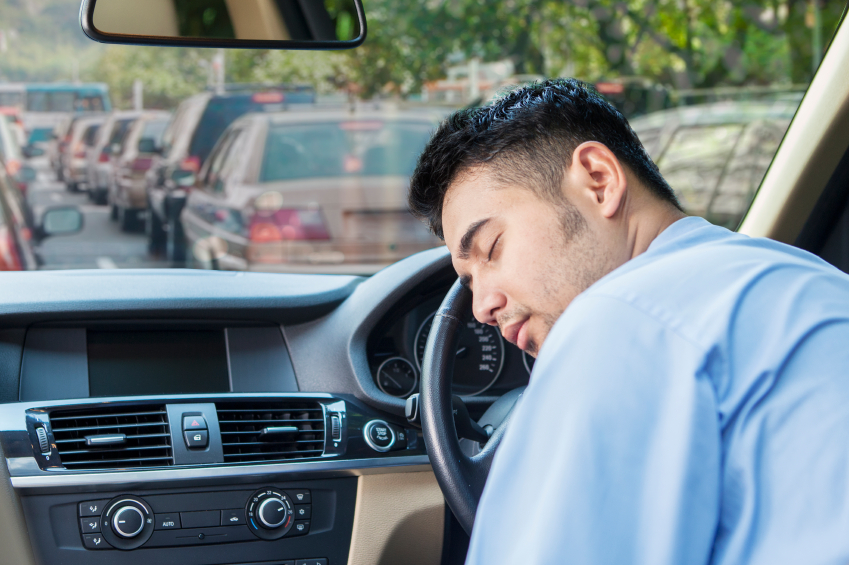The MythBusters Take on Drowsy Driving

Everyone knows that it’s against the law to drink and drive. But would you believe that getting behind the wheel on insufficient sleep can be just as dangerous?
To test this claim, the MythBusters stayed up for 30 hours and drove two courses– one with plenty of quick stops, turns and parallel parking and the other with 25 laps on a track.
Comparing their sleep deprived drives to those that involved taking several shots of liquor to reach a “buzzed” level, they surprisingly drove 10 times worse when tired than under the influence of alcohol.
According to the CDC, this sounds about right. After 18 hours without sleep, the cognitive ability of drivers compares to a person with a blood alcohol content of 0.05%. Going without sleep for 24 hours sends the equivalent over the legal limit to a level of 0.10%.
This is in no way to say that driving while intoxicated is safe by any means, but merely to demonstrate how hopping into the driver’s seat after little to no sleep can be just, if not more dangerous than being drunk.
More facts about drowsy driving
Based on NHTSA statistics, drowsy driving was responsible for approximately 72,000 accidents, 800 deaths and 44,000 injuries in 2013. Despite these stats, 60% of Americans said they have driven tired and 37% admitted to having fallen asleep at the wheel in the past year.
It’s not that people want to put their lives or the lives of others at risk. Many times, drowsy drivers think they’re fine or that they can make it to their next stop before falling asleep at the wheel. Even if you don’t fall asleep, drowsy driving dramatically slows your response time.
Enter your zip code below to view companies that have cheap insurance rates.
Secured with SHA-256 Encryption
How Can You Detect Drowsy Driving?
We know you’re busy and have places to go. Some would say if in doubt, stay off the road. Without going quite that far, if you catch yourself doing any of the following, it’s time to pull over and rest whether you’re on a road trip or just coming home from work.
Signs you’re too tired to drive:
- Eyelids droop
- Mind wanders or you daydream
- Yawning
- Drifting into other lanes
- Inability to focus
- Difficulty holding head upright
- Slow reaction time
Who Is Most at Risk of Drowsy Driving?
Those driving alone and/or between the hours of 12am-8am and 1pm-3pm are at a greater risk of falling asleep at the wheel. This increases if driving alone. In fact, in 82% of car accidents caused by drowsiness, the driver was alone.
Shift workers, young male drivers, people with certain medical conditions, and those who don’t get enough sleep are also at higher risk when it comes to drowsy driving. Regardless of the reasons why, many of these drives end in fatal crashes or other more minor drowsy driving crashes.
How Can You Prevent Drowsy Driving Crashes?
1. One easy way to stay safe is to get some shut-eye! According to the National Institutes of Health, adults need 7 or 8 hours of sleep a day, and teens need even more at 9 to 10 hours. If you know you haven’t gotten sufficient sleep, then make sure you rest up before you get in the car.
If you get 7-8 hours of sleep per night, but wake up feeling tired, something else might be going on. Doctors can do sleep studies to check for things like obstructive sleep apnea that could be reducing the quality of your sleep. This is especially important for commercial drivers who are always on the road. With modern innovations, doctors can run tests on sleepy drivers even if you’re on the road and they’re not. This is not the only sleep disorder, but it has become increasingly prevalent.
2. The buddy system is another great way to keep your eyes on the road and not behind your eyelids. If you’re going long distances, bring someone along. They can trade off driving or help keep you awake if you find yourself getting sleepy. If both of you are tired, the best route to take is to pull off the road and find somewhere to get some sleep.
3. You might not realize it, but some medications have side effects that can cause drowsiness. Make sure you read the labels before taking anything and getting behind the wheel.
4. Drink some caffeine to give yourself a boost of energy if you think you might be getting sleepy any time soon. If your regular dose of caffeine isn’t quite doing it for you, find somewhere to take a nap.
5. Look at the time of day. Do you need to be on the road? If it’s the early morning hours or another high risk time, maybe you don’t. If you’re on a rotating schedule, can your work put you on a regular schedule or give you a day off between an overnight or late night shift and your next day shift?
6. Get on a regular sleep schedule. Sometimes, getting adequate sleep is all about setting a schedule for yourself. You can still check for sleep disorders. But simple things like not working where you sleep, going to bed earlier, and not drinking caffeine after a certain time can go a long way to reduce lack of sleep.
Remember, most auto insurance rates will increase with any accident no matter who is at fault. In order to keep your premiums down and the road a safer place, take a cat nap or a nice long snooze before you hit the road the next time. That way, your car trips will be a dream instead of a nightmare.
Free Insurance Comparison
Enter your zip code below to view companies that have cheap insurance rates.
Secured with SHA-256 Encryption
